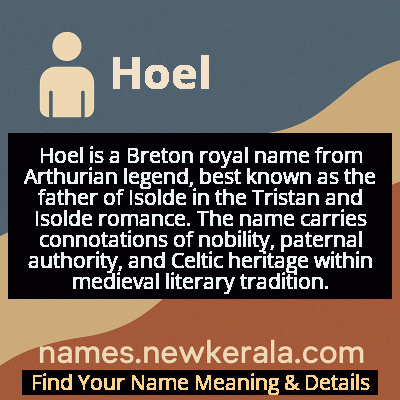Hoel Name Meaning & Details
Origin, Popularity, Numerology Analysis & Name Meaning of Hoel
Discover the origin, meaning, and cultural significance of the name HOEL. Delve into its historical roots and explore the lasting impact it has had on communities and traditions.
Name
Hoel
Gender
Male
Origin
Arthurian
Lucky Number
4
Meaning of the Name - Hoel
Hoel is a Breton royal name from Arthurian legend, best known as the father of Isolde in the Tristan and Isolde romance. The name carries connotations of nobility, paternal authority, and Celtic heritage within medieval literary tradition.
Hoel - Complete Numerology Analysis
Your Numerology Number
Based on Pythagorean Numerology System
Ruling Planet
Uranus (Rahu)
Positive Nature
Strong sense of order, loyal, practical, and disciplined.
Negative Traits
Stubborn, overly serious, rigid, and prone to feeling restricted.
Lucky Colours
Blue, gray.
Lucky Days
Saturday.
Lucky Stones
Blue sapphire.
Harmony Numbers
1, 7, 8.
Best Suited Professions
Managers, engineers, accountants, organizers.
What People Like About You
Dependability, discipline, practicality.
Famous People Named Hoel
Hoel of Brittany
Arthurian King
Father of Isolde and ally of King Arthur in Arthurian romances
Hoel I of Brittany
Historical Duke
Duke of Brittany who defended his territory against Viking invasions
Hoel II of Brittany
Historical Duke
Ruled Brittany and supported church reforms during his reign
Saint Hoel
Religious Figure
Welsh saint who founded churches in Cornwall and Brittany
Name Variations & International Equivalents
Click on blue names to explore their detailed meanings. Gray names with will be available soon.
Cultural & Historical Significance
Historically, the name appears in Breton and Welsh royal lineages, with several historical figures named Hoel ruling in Brittany between the 6th and 11th centuries, blending the legendary figure with actual historical rulers who defended Celtic territories against Frankish and Viking incursions. This dual existence in both legend and history gives the name a rich cultural resonance that spans mythology and actual medieval politics, representing the enduring Celtic identity in the face of external pressures.
Extended Personality Analysis
In Arthurian tradition, Hoel is typically portrayed as a wise, loyal, and honorable ruler who embodies the chivalric ideals of medieval nobility. He demonstrates strong paternal qualities as Isolde's father, showing both authority and compassion in his governance. As King of Brittany, he exhibits diplomatic skill in maintaining alliances with Arthur's court while preserving his kingdom's independence.
The character suggests a personality marked by steadfastness, traditional values, and a strong sense of duty to both family and kingdom. His portrayal across various Arthurian texts consistently shows him as a reliable ally who can be counted on in times of crisis, yet also capable of making difficult decisions when his daughter's fate or kingdom's welfare are at stake. This combination of royal authority and paternal concern creates a complex figure who must navigate the tensions between political responsibility and personal affection.
Modern Usage & Popularity
Hoel remains a rare but distinctive name in modern times, primarily used in Brittany and among Arthurian enthusiasts. It sees occasional usage as a given name in Celtic regions, particularly in Brittany where it maintains cultural significance as a connection to both legendary and historical figures. The name has not achieved widespread popularity in English-speaking countries but appears occasionally in historical fiction communities and among parents seeking unique Arthurian names with strong Celtic roots. Its usage trends show it as a niche choice that appeals to those with specific interest in medieval literature or Celtic heritage, rather than following mainstream naming patterns, making it an distinctive option for parents seeking a name with deep historical and literary resonance.
Symbolic & Spiritual Meanings
Hoel symbolizes noble authority, paternal protection, and Celtic heritage within the Arthurian tradition. The name carries strong connotations of royal dignity and steadfast alliance, representing the ideal medieval ruler who must balance family obligations with political responsibilities. Symbolically, it evokes themes of cross-cultural connection between Brittany and Britain, serving as a bridge between different Celtic traditions and representing the enduring nature of Celtic identity. The name also embodies the tragic dimension of paternal love, as Hoel's role as Isolde's father places him at the center of one of literature's great love stories, where his authority and protective instincts conflict with his daughter's romantic destiny and personal autonomy.

